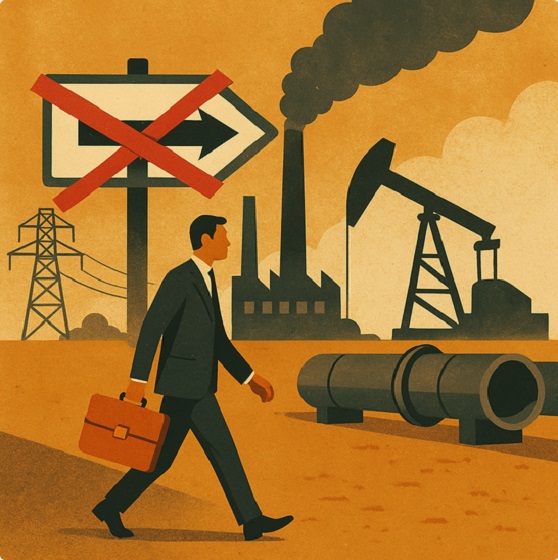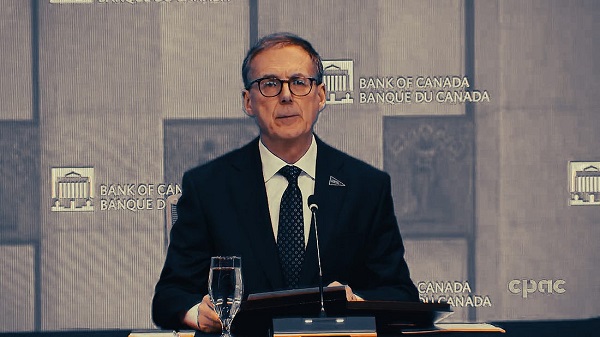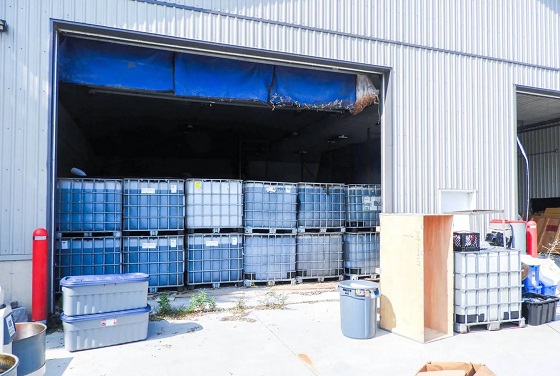Business
Canada Is Suffocating Its Future One Policy At A Time

From the Frontier Centre for Public Policy
By David Leis
While wealth-generating industries are hindered, subsidies flow to politically favored projects, leaving capital fleeing and IPO activity collapsing. Canada’s prosperity is at risk unless leaders cut red tape, open trade, reform taxes, and support industries that create real growth.
Red tape, capital flight and anti-growth policies are draining Canada’s economy. Our prosperity is at risk if leaders don’t act now
Canada is slowly dismantling the foundations of its own prosperity. Instead of unleashing our strengths, we’ve layered on regulation, red tape and ideology that repel investment and weaken our economy—one policy at a time.
This isn’t hyperbole. For over a decade, Canada’s per capita gross domestic product (GDP) has stagnated. Our productivity has fallen behind global peers. Young people are leaving the country, investment is drying up and even our own entrepreneurs are taking their capital—and their ideas—elsewhere.
We’re not failing because of a lack of resources. Quite the opposite. We have everything: land, minerals, oil, gas, water, agriculture and human talent. But whether it’s energy infrastructure, mining projects or manufacturing capacity, the answer from Ottawa is almost always “no”—thanks to layers of red tape, regulation and risk-averse policy.
Bloated bureaucracy, regulatory overreach and ideologically driven legislation—such as Bill C-69, which made it far harder to approve major energy and infrastructure projects, and Bill C-5, which gives Ottawa sweeping veto power in the name of reconciliation—have created an environment so hostile to investment that many firms no longer even try.
One example illustrates this clearly. The Trans Mountain pipeline—a major oil pipeline intended to carry Alberta crude to Pacific markets—was crippled by government takeover and quintupled in cost. We’re now told it might expand further—if regulators allow it.
Meanwhile, 15 per cent of the pipeline sits idle. This portion, set aside for short-term or on-demand shipments—known as spot capacity—is burdened by toll rates so high that shippers can’t justify using it. These prohibitively high fees, meant to recover the ballooning construction costs, have effectively priced out would-be users, leaving critical infrastructure underused and investment returns diminished.
This isn’t just bad economics. It directly weakens the very foundation of Canadian life—good jobs, innovation and upward mobility. Without strong investment in productive sectors like energy, mining and agriculture, we lose the wealth and opportunity that support our way of life.
Yet we continue to subsidize politically fashionable projects such as pumping billions into electric vehicle plants while punishing the industries that pay the bills.
And the message to innovators is just as bleak: new companies are staying private, avoiding public markets like the Toronto Stock Exchange, where new listings—known as IPOs—have all but disappeared. Bloomberg has reported just one large IPO in Canada so far this year. That’s unthinkable in a country that once marketed itself as a global financial hub. It’s part of a deeper problem: productivity is flatlining, and capital is fleeing, with hundreds of billions of dollars quietly leaving Canada in recent years.
This is why the average Canadian feels poorer—at the grocery store, in job prospects and when trying to save for a home. When investment dries up, so does the future. Our middle class, once the backbone of this country, is being squeezed from all sides: by inflation, stagnating wages, rising taxes and the shrinking availability of meaningful work.
Even our national identity is eroding. What kind of country punishes its wealth creators? What kind of government claims to support Indigenous partnerships while vetoing resource projects that offer Indigenous communities real economic independence? What kind of democracy penalizes companies for speaking openly about their environmental performance?
Canadians are starting to feel it. Young graduates are leaving. Parents are unsure how their kids will afford homes—or futures. We’re told this is the cost of progress. But the truth is simpler: we’re managing our decline.
There is another way. Open internal trade. Restore industrial freedom. Reform taxation to reward innovation and risk. End the obsession with slogans and deliver real-world results.
Canada still has every advantage for renewal. But it will take leadership willing to act. Canadians are ready. It’s time for our policies to catch up.
Renewal begins with the conviction that this country can thrive again—not in theory, not one day, but now. It begins with a government willing to say “yes” to building, producing, investing and competing. It begins with citizens who understand that prosperity is not permanent—it must be earned, protected and made possible by policy.
Without a vibrant economy, there is no middle class. And without a middle class, there is no Canada.
David Leis is President and CEO of the Frontier Centre for Public Policy and host of the Leaders on the Frontier podcast.
Business
“We have a deal”: Trump, Xi strike breakthrough on trade and fentanyl

President Trump declared “we have a deal” Thursday after meeting with Chinese President Xi Jinping in South Korea, describing their nearly two-hour summit as “a 12 out of 10.” Speaking aboard Air Force One, Trump told reporters the two leaders reached a sweeping agreement to stabilize trade relations and address the deadly fentanyl crisis. “We have a deal. Now, every year we will renegotiate the deal,” Trump said. “But I think the deal will go on for a long time.”
According to Trump, Xi agreed to suspend for one year China’s export restrictions on products made with rare-earth and critical minerals — materials essential to the production of semiconductors, batteries, and high-tech magnets. “There’s no roadblock at all on rare earth,” he said. “It’s a one-year deal that I think will be very routinely extended.” In exchange, Trump said the U.S. would lower the average tariff rate on Chinese imports from 57.6% to 47.6%. Trump emphasized that Xi also committed to intensifying China’s crackdown on fentanyl exports, which have been a major driver of overdose deaths in the United States. “We agreed he’s going to work very hard to stop the flow,” Trump said. “I think you’re going to see a big difference.”
Beijing also pledged to resume “tremendous” purchases of American soybeans, reversing its earlier retaliatory halt. In a Truth Social post later Thursday, Trump said China had additionally agreed to begin purchasing U.S. oil and gas, noting that “a very large-scale transaction may take place concerning the purchase of oil and gas from the Great State of Alaska.” The president confirmed that Taiwan was not discussed during the meeting but said both sides talked about working together to bring an end to the war in Ukraine. “We didn’t really discuss the Russian oil,” he added. “We discussed working together to see if we can get that war finished.”
The meeting, held at a South Korean air base, marked the first in-person exchange between Trump and Xi since his return to the White House. The two leaders greeted each other warmly, with Xi telling Trump, “Great pleasure to see you again.” Xi praised Trump’s leadership, saying, “China’s development goes hand in hand with your vision to make America great again,” and added that the two nations “are fully able to help each other succeed and prosper together.” Much of Thursday’s agreement builds upon a framework negotiated earlier this month in Kuala Lumpur between U.S. and Chinese trade teams.
Trump said he plans to visit China in April, calling the meeting “amazing” and “an outstanding group of decisions.” He did not say whether the pending TikTok deal was discussed. The renewed cooperation on fentanyl follows years of tension over China’s role in the U.S. opioid crisis. The CDC reports the drug has killed nearly 330,000 Americans in the past five years — roughly one in every 1,000 people. Trump has long pressed Beijing to stop the export of precursor chemicals used to make fentanyl, arguing the problem is both moral and economic. “They make $100 million selling fentanyl into our country,” Trump said last week. “They lose $100 billion with the 20% tariff. It’s not a good business proposition.”
Trump left Thursday’s summit expressing confidence that the new arrangement marked a major step forward. “On the scale of 0 to 10, with 10 being the best, I would say the meeting was a 12,” he said. “It was an amazing meeting — and I think this deal will go on for a long time.”
Business
Canada’s attack on religious charities makes no fiscal sense

This article supplied by Troy Media.
 By Lee Harding
By Lee Harding
Ottawa is targeting the charitable tax status of faith-based groups. The fallout could hit every Canadian community
The possibility that Canadian religious organizations will lose their charitable status has never been more real.
On Jan. 6, Parliament’s Standing Committee on Finance recommended numerous changes, including Recommendation 430: “Amend the Income Tax Act to define a charity, which would remove the privileged status of ‘advancement of religion’ as a
charitable purpose, meaning faith-based organizations could lose access to tax benefits.”
The B.C. Humanist Association, a secular advocacy group, has long advocated for removing religion as a stand-alone charitable purpose. That idea is reflected in Recommendation 430. Before adopting such a proposal, the finance committee should have reviewed a study published last November by Cardus, a Canadian think tank focused on faith, civil society and public policy.
The Cardus study examined 64 Christian congregations in various provinces to assess the socio-economic value of their impact. It suggested that congregations make an $18.2-billion socioeconomic contribution to Canadian society, well in excess of tax exemptions and rebates equal to $1.7 billion. The net positive result of $16.5 billion—a “halo effect”—is more than 10
times the value of the tax exemptions.
The implications are clear: society will be worse off if the loss of religious charitable status leads to a drop of more than 10 per cent in donations to affected charities. Why risk it?
When congregations unravel, society follows in ways that go beyond mere economics. As Cardus explains, churches often provide space, often at no cost or below-market rates, for cultural and artistic events, recreation and sports, education, social services and other community activities. They also deliver addiction recovery, counselling and mental-health support, child care, refugee sponsorship and settlement services for newcomers, education and food banks.
Whether institutionally or personally, helping people is often an integral extension of religious belief. A 2012 Statistics Canada study found that the 14 per cent of Canadians who attend church weekly offer 29 per cent of the nation’s volunteer hours and provide 45 per cent of all charitable donations.
No party has explicitly endorsed removing charitable status for religion. But the Bloc Québécois, NDP and Liberals dominated the committee recommendation to remove religion as a charitable purpose. The Conservative Party, which held a minority on the committee, was alone in opposing it outright.
Randy Crosson, executive director of Freedoms Advocate, is organizing a national pushback. In a speech given Oct. 1 to the Regina Civic Awareness and Action Network, he said the recommendation was a “shot across the bow” to gauge public reaction.
“This isn’t just about donors losing tax receipts. It’s about churches losing buildings, staff losing jobs, and ministries being forced to shut down due to reduced donations. This is a direct threat to the future of faith in Canada, and it’s happening fast,” Crosson explained in an online video.
Crosson said religion enjoys less participation and more opposition than in previous decades. Church attendance has slumped since the pandemic, and some Canadians continue to criticize churches for their historical involvement in residential schools.
The Quebec government has also pursued a strongly secular approach to public policy. In 2019, Quebec’s Bill 21 used the notwithstanding clause of the Constitution to ban public servants from wearing religious symbols, such as hijabs, turbans or crucifixes. In August, Quebec’s secularism minister, Jean François Roberge, said that the “proliferation of street prayer is a serious and sensitive issue” and promised to bring legislation to ban it.
That’s why Crosson is urging religious leaders to launch a three-part campaign.
“First, an open letter drafted with legal and faith leaders to show government and the media the real value of the church in Canadian society. Second, mass signatures. We need churches, leaders and individuals to sign the letter,” Crosson says in a video appeal. “And third, a national documentary based on the open letter. This will be released publicly and spread through churches, media and social platforms.”
The Frontier Centre for Public Policy has also come out publicly against the proposed change. A report by Senior Fellow Pierre Gilbert entitled Revoking the Charitable Status for the Advancement of Religion: A Critical Assessment makes a case for the status quo, pointing to benefits such as those mentioned above.
For now, at least, the idea is on hold. A published email response by Liberal MP Karina Gould, the chair of the House of Commons’ Standing Committee on Finance, said the charitable status of faith-driven non-profits will not be revoked in the Nov. 4 budget.
That’s good news. Faith is a big motivator of charity, and it’s hard to see how a less charitable society is a better one. If governments want to balance the books, they should rein in spending, not put faith-based charities at risk.
Lee Harding is a research fellow for the Frontier Centre for Public Policy.
Troy Media empowers Canadian community news outlets by providing independent, insightful analysis and commentary. Our mission is to support local media in helping Canadians stay informed and engaged by delivering reliable content that strengthens community connections and deepens understanding across the country
-

 National1 day ago
National1 day agoCanadian MPs order ethics investigation into Mark Carney’s corporate interests
-

 Business2 days ago
Business2 days agoFord’s Liquor War Trades Economic Freedom For Political Theatre
-

 Banks2 days ago
Banks2 days agoBank of Canada Cuts Rates to 2.25%, Warns of Structural Economic Damage
-

 Bruce Dowbiggin21 hours ago
Bruce Dowbiggin21 hours agoGet Ready: Your House May Not Be Yours Much Longer
-

 Alberta1 day ago
Alberta1 day agoNobel Prize nods to Alberta innovation in carbon capture
-

 Business2 days ago
Business2 days agoBill Gates walks away from the climate cult
-

 MxM News1 day ago
MxM News1 day agoTrump ‘Grateful’ For Bill Gates Pivot, Declares Victory Over ‘Climate Change Hoax’
-

 Internet2 days ago
Internet2 days agoMusk launches Grokipedia to break Wikipedia’s information monopoly



